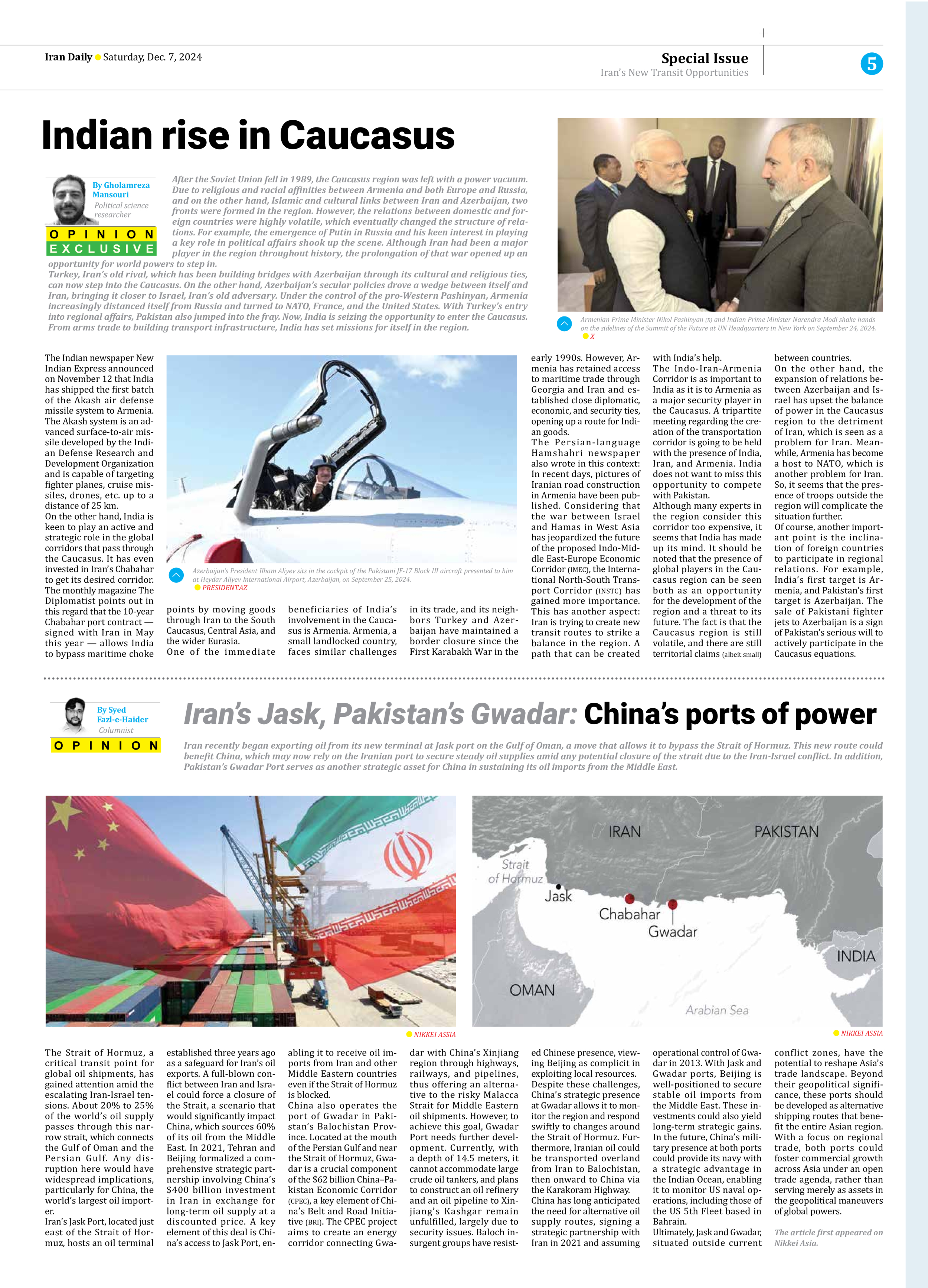
Indian rise in Caucasus
After the Soviet Union fell in 1989, the Caucasus region was left with a power vacuum. Due to religious and racial affinities between Armenia and both Europe and Russia, and on the other hand, Islamic and cultural links between Iran and Azerbaijan, two fronts were formed in the region. However, the relations between domestic and foreign countries were highly volatile, which eventually changed the structure of relations. For example, the emergence of Putin in Russia and his keen interest in playing a key role in political affairs shook up the scene. Although Iran had been a major player in the region throughout history, the prolongation of that war opened up an opportunity for world powers to step in. Turkey, Iran’s old rival, which has been building bridges with Azerbaijan through its cultural and religious ties, can now step into the Caucasus. On the other hand, Azerbaijan’s secular policies drove a wedge between itself and Iran, bringing it closer to Israel, Iran’s old adversary. Under the control of the pro-Western Pashinyan, Armenia increasingly distanced itself from Russia and turned to NATO, France, and the United States. With Turkey’s entry into regional affairs, Pakistan also jumped into the fray. Now, India is seizing the opportunity to enter the Caucasus. From arms trade to building transport infrastructure, India has set missions for itself in the region.
On the other hand, India is keen to play an active and strategic role in the global corridors that pass through the Caucasus. It has even invested in Iran’s Chabahar to get its desired corridor. The monthly magazine The Diplomatist points out in this regard that the 10-year Chabahar port contract — signed with Iran in May this year — allows India to bypass maritime choke points by moving goods through Iran to the South Caucasus, Central Asia, and the wider Eurasia.
One of the immediate beneficiaries of India’s involvement in the Caucasus is Armenia. Armenia, a small landlocked country, faces similar challenges in its trade, and its neighbors Turkey and Azerbaijan have maintained a border closure since the First Karabakh War in the early 1990s. However, Armenia has retained access to maritime trade through Georgia and Iran and established close diplomatic, economic, and security ties, opening up a route for Indian goods.
The Persian-language Hamshahri newspaper also wrote in this context: In recent days, pictures of Iranian road construction in Armenia have been published. Considering that the war between Israel and Hamas in West Asia has jeopardized the future of the proposed Indo-Middle East-Europe Economic Corridor (IMEC), the International North-South Transport Corridor (INSTC) has gained more importance. This has another aspect: Iran is trying to create new transit routes to strike a balance in the region. A path that can be created with India’s help.
The Indo-Iran-Armenia Corridor is as important to India as it is to Armenia as a major security player in the Caucasus. A tripartite meeting regarding the creation of the transportation corridor is going to be held with the presence of India, Iran, and Armenia. India does not want to miss this opportunity to compete with Pakistan.
Although many experts in the region consider this corridor too expensive, it seems that India has made up its mind. It should be noted that the presence of global players in the Caucasus region can be seen both as an opportunity for the development of the region and a threat to its future. The fact is that the Caucasus region is still volatile, and there are still territorial claims (albeit small) between countries.
On the other hand, the expansion of relations between Azerbaijan and Israel has upset the balance of power in the Caucasus region to the detriment of Iran, which is seen as a problem for Iran. Meanwhile, Armenia has become a host to NATO, which is another problem for Iran. So, it seems that the presence of troops outside the region will complicate the situation further.
Of course, another important point is the inclination of foreign countries to participate in regional relations. For example, India’s first target is Armenia, and Pakistan’s first target is Azerbaijan. The sale of Pakistani fighter jets to Azerbaijan is a sign of Pakistan’s serious will to actively participate in the Caucasus equations.







